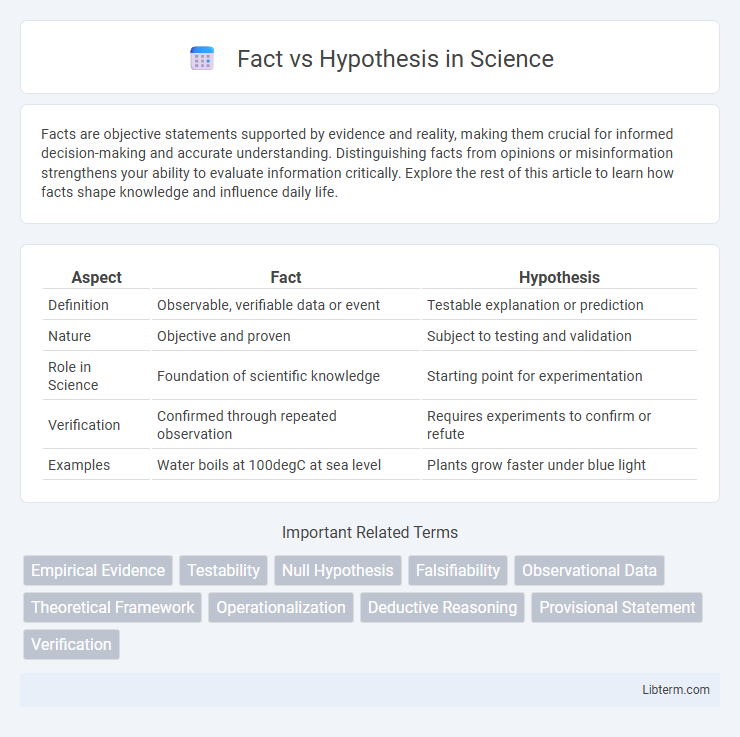Facts are objective statements supported by evidence and reality, making them crucial for informed decision-making and accurate understanding. Distinguishing facts from opinions or misinformation strengthens your ability to evaluate information critically. Explore the rest of this article to learn how facts shape knowledge and influence daily life.
Table of Comparison
| Aspect | Fact | Hypothesis |
|---|---|---|
| Definition | Observable, verifiable data or event | Testable explanation or prediction |
| Nature | Objective and proven | Subject to testing and validation |
| Role in Science | Foundation of scientific knowledge | Starting point for experimentation |
| Verification | Confirmed through repeated observation | Requires experiments to confirm or refute |
| Examples | Water boils at 100degC at sea level | Plants grow faster under blue light |
Understanding Facts and Hypotheses
Facts represent verified information supported by empirical evidence and consistent observation, forming the foundation of scientific knowledge. Hypotheses are tentative explanations or predictions subject to testing and validation through experimentation and data analysis. Distinguishing facts from hypotheses is essential for scientific progress, as facts confirm reality while hypotheses guide inquiry and exploration.
What Defines a Scientific Fact?
A scientific fact is an objective observation repeatedly confirmed through empirical evidence and consistent experimentation, distinguishing it from hypotheses, which are testable, provisional explanations. Facts serve as foundational data points in scientific research, validated by reproducibility and peer review rather than subjective belief. Defining a scientific fact requires verifiability, measurable outcomes, and consensus within the scientific community to ensure reliable knowledge building.
Characteristics of a Hypothesis
A hypothesis is a testable and falsifiable statement that proposes a potential explanation for a specific phenomenon or set of observations. It serves as a basis for scientific experimentation, requiring clear variables and measurable outcomes to validate or refute its accuracy. Unlike a fact, which is an established truth supported by evidence, a hypothesis remains tentative until empirical data confirms or disproves its claims.
Differences Between Facts and Hypotheses
Facts are objective observations or measurements that can be verified through direct evidence or experimentation, such as water boiling at 100degC at sea level. Hypotheses are testable and falsifiable predictions or explanations formulated to explain phenomena, serving as starting points for scientific investigation. The key difference lies in facts being established truths, while hypotheses remain provisional until validated or disproven through research.
The Role of Facts in Scientific Inquiry
Facts serve as the foundational evidence in scientific inquiry, grounding hypotheses in observable and verifiable reality. They provide the empirical data necessary for testing, refining, or refuting hypotheses, ensuring that scientific theories remain aligned with objective measurement. Reliable facts enable scientists to build accurate models and advance knowledge through reproducible experimentation and observation.
Formulating Effective Hypotheses
Formulating effective hypotheses involves creating clear, testable statements that establish a specific relationship between variables, distinguishing them from established facts. A well-crafted hypothesis guides focused research by predicting outcomes based on theoretical frameworks, enabling empirical validation or refutation. Precision in hypothesis formulation enhances experiment design, ensuring measurable and observable data that advance scientific inquiry.
How Facts Support or Refute Hypotheses
Facts serve as empirical evidence that supports or refutes hypotheses through observation and experimentation. When facts align consistently with a hypothesis, they strengthen its validity by confirming predictions and underlying assumptions. Conversely, contradictory facts challenge the hypothesis, prompting revision or rejection to ensure scientific accuracy.
Common Misconceptions About Facts vs Hypotheses
Many people mistakenly believe that facts and hypotheses carry equal weight in scientific research, but facts are verified observations while hypotheses are testable predictions requiring validation. Another common misconception is that hypotheses become facts once proven, whereas in reality, hypotheses remain tentative explanations even after supporting evidence. Confusing opinions or beliefs with facts often leads to misunderstandings about the scientific method and the nature of evidence-based knowledge.
Examples Illustrating Fact vs Hypothesis
A fact is a statement supported by empirical evidence, such as "Water boils at 100degC at sea level," which can be observed and verified through experimentation. A hypothesis is a testable prediction like "Increasing sunlight exposure will accelerate plant growth," which requires further investigation to confirm or refute. These examples demonstrate how facts represent established knowledge, while hypotheses serve as starting points for scientific inquiry.
Importance of Distinguishing Facts from Hypotheses
Distinguishing facts from hypotheses is crucial in scientific research to ensure accurate data interpretation and avoid misleading conclusions. Facts are objective, verifiable observations, while hypotheses are tentative explanations that require testing and validation. Proper differentiation supports the development of reliable knowledge and guides effective decision-making processes.
Fact Infographic

 libterm.com
libterm.com